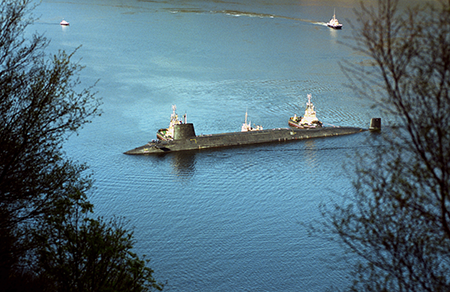"I find hope in the work of long-established groups such as the Arms Control Association...[and] I find hope in younger anti-nuclear activists and the movement around the world to formally ban the bomb."
Scotland Confirms Royal Navy Leaked Radioactive Water
September 2025
By Shizuka Kuramitsu
After six years of secrecy, the Scottish government confirmed that the Royal Navy released radioactive water into Loch Long near Glasgow, due to its repeated failure to maintain a network of 1,500 water pipes at the Coulport armaments depot, the home base for the United Kingdom’s nuclear warheads.

According to the report co-published Aug. 9 by The Ferret and The Guardian, The Ferret obtained internal documents from the Scottish Government’s environmental watchdog, Scottish Environment Protection Agency (SEPA), in August, which “disclose that radioactive water drained into the loch, which is popular with swimmers, divers, kayakers and fishers, after a major flood in 2019.”
Thiry-three documents published by SEPA Aug. 5 disclosed for the first time the problems that the Royal Navy had been having with pipes bursting and flooding parts of the “Trident Special Area” at Coulport, “one of the most secretive, sensitive and secure areas in the UK.” The files indicate that one pipe burst at Coulport in 2010, two burst in 2019, and two more burst in 2021.
The UK navy base Clyde at Faslane and the armaments depot at Coulport serve as the Royal Navy’s main presence in Scotland, where it is responsible for storing, processing, and maintaining key elements of the UK nuclear warheads for Trident submarines, a weapons processing facility, and missile bunkers. In 2019, 2023, and 2024, The Ferret “first made a freedom of information request for files on radioactive problems at Coulport and Faslane.”
The two newspapers reported that SEPA and the UK Defense Ministry sought to keep the documents secret for national security reasons, despite repeated inquiries by reporters since 2019. The government finally released the files on the orders of David Hamilton, the Scottish information commissioner, who polices Scotland’s freedom of information laws.
Speaking to The Guardian Aug. 9, the Scottish Green Party’s co-leader, Patrick Harvie, said that there “are few sites as dangerous and where an accident or shoddy maintenance could have such potentially catastrophic consequences.” He called for more transparency from the defense ministry.
The Ferret indicated Aug. 9 that the UK Defense Ministry “has clamped down on releasing information about the UK nuclear weapons programme, citing national security,” including censoring annual nuclear safety assessments reported in 2017. The Guardian reported in 2009 that “there had been leaks of radioactive coolant into the neighboring area, the Firth of Clyde from nuclear submarines in 2004, 2007, and 2008.”
According to the Aug. 9 report by The Ferret, both SEPA and the UK Defense Ministry claimed that there “have been no unsafe releases of radioactive material into the environment at any stage,” and that “the risk to the environment from effluent discharges is of no regulatory concern,” based on SEPA’s annual assessments.
